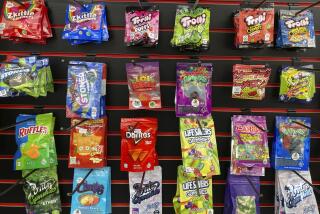Marijuana Testing: What Level Is Acceptable in Job Applicant?
- Share via
How high a level of marijuana should a drug test show before a job applicant is rejected?
It is a question that any company with a drug-testing program ultimately has to decide.
Drug tests use a measure called nanograms to report the level of marijuana present in a urine sample. It is up to the company to decide at what level it will declare a job applicant positive for marijuana, and not to be hired.
If the level is set too low, scientists say the reliability of the test results are open to question.
Greyhound found that out after it established a cutoff of 20 nanograms--or 20 parts of tetrahydrocannabinol, the active ingredient in marijuana, per million parts of fluid.
At arbitration hearings, union attorneys and medical experts questioned the accuracy of the tests. Naresh Jain, chief of toxicology at Rancho Los Amigos Hospital in Downey and a professor at the USC Medical School, testified that up to 35% of the test results would be inaccurate at that level.
Greyhound later raised the cutoff to 100 nanograms, according to Norbert Anderson, the company’s chief lawyer.
Greyhound is not alone in going to a higher cutoff. The U.S. military, Lockheed, the Los Angeles Department of Water and Power, PG&E; and others use 100.
But many other companies use 50, including the Los Angeles Times.
The debate does not turn on the scientific validity of the tests alone.
Alfred Klein, a Los Angeles management attorney who advises companies on drug testing, indicated that one reason for the different levels is that marijuana has gained a degree of social acceptability not shared by other drugs, such as cocaine and heroin.
Companies, thus, are uncertain as to the practicality of eliminating everyone who shows the slightest trace of marijuana usage.
Klein said there is no similar controversy about just how much cocaine constitutes a positive test. “Having cocaine in your system is like having lunch with the devil,” Klein said.
More to Read
Sign up for Essential California
The most important California stories and recommendations in your inbox every morning.
You may occasionally receive promotional content from the Los Angeles Times.










